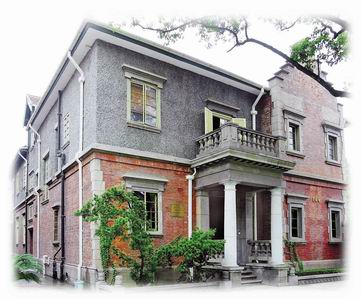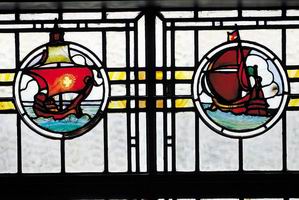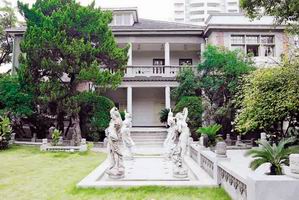Shanghai Daily news



The Western-style garden house was the home of two
mayors of Shanghai before the founding of the People¡¯s Republic of China in
1949. The beauty of the house is reflected in its grand garden and such
details as the stained-glass window patterns.
The 82-year-old Western-style garden house was the home of two long-ago
mayors of Shanghai -- one a traitor to China and the other a friend of Zhou
Enlai, writes Michelle Qiao.
The villa at 201 Anfu Road has a stylish garden
that mingles Eastern and Western elements which might derive from the
``East-meets-West'' tendencies of one of its former owners, Kuo-Cheng Wu, a
mayor of Shanghai before Liberation in 1949.
It is a British country-style
red-brick house with little pebbles plastered on its outer wall. The sun-filled
garden is spacious and the scent of flowers in bloom can be enjoyed all year
round. The garden has a green-tile traditional memorial archway and a
Chinese-style corridor that encircles the whole area. There is also a stone
table with a Chinese chess board inlaid as well as four white marble Greek
sculptures.
The east room on the ground floor was the family hall where Wu's
mother went to worship the Buddha. Typical Buddhist lotus patterns are
everywhere in this beautifully decorated room with its scripts for chanting.
The 2,447-square-meter house and garden formerly housed the Shanghai Drama
Arts Center which occupied the villa until several years ago when a security
company rented the house and made some renovations.
``It's so quiet working
here,'' says Wu Ying, a staff member of the security company. ``The garden
has flowers and fruit trees that bloom in each of the four seasons. The Chinese
dates taste so sweet. There used to be a pool in the middle of the garden until
the drama center filled it in and grassed the area.''
Built in 1922, the
house's first owner was named F.P. Musso who lived in it until World War II,
according to an article in the North China Morning Post. But in the 1940s it
became the home of Pan Sanxing, a traitor to China who was made mayor of
Shanghai during the Japanese occupation of the city.
Pan bought the house in
1941 as a ``love nest'' for himself and his social butterfly of a wife, Wang Ji.
With the support of the Japanese invaders, Pan opened a casino on Changning Road
and also renovated a garden villa on Wuding Road which he turned into a night
club for prostitution and drug trafficking.
Pan later became a director of
several companies including the Shanghai Shipping Company. His power and wealth
earned him the nickname, ``Little Du Yuesheng,'' after the notorious overlord of
Shanghai's ``Green Gang.'' Pan's career came to an end in 1946 when he was
sentenced to seven years jail for his crimes during the war.
He was granted
a special amnesty before Liberation in 1949 and escaped to Hong Kong where he
died in the mid-1950s. Wang followed her lover to Hong Kong and died there in
the 1960s.
All Pan's assets were confiscated on his arrest and the house was
given to Kuo-Cheng Wu who was the mayor of Shanghai from May 1946 to April 1949.
Wu made a complete renovation of the villa and lived there with his wife,
four children, his parents and 13 servants.
Born in 1903 in Hubei Province,
Wu was a middle school classmate of China's late Premier Zhou Enlai in Tianjin.
He later studied political science in the United States and gained a doctorate
in Philosophy from Princeton University in 1926.
He returned home to China,
embarked on a political career and married Huang Zhuoqun, a beauty nine years
his junior, in 1931.
In 1932 he became the secretary and protege of Chiang
Kai-shek who appointed him mayor of Hankou in Hubei Province.
Later, when he
was mayor of Shanghai, Wu proved to be an energetic civic leader who rose at 7am
every day and worked in his office until midnight.
He left for Taiwan in
April 1949 where he continued to have high positions in the Kuomintang
government until he fell out with Chiang and left for the United States in 1953.
``The style of the villa itself is not very creative but the garden is truly
characteristic of its era,'' says Zheng Peiyuan, an architect experienced in
renovating old houses, including this one. ``We can see into the mind of
Kuo-Cheng Wu from his `East-meets-West' garden. He grew up under the influence
of a traditional Confucian education but later studied overseas for many years.
He was a traditional Chinese `gentleman' who pursued open, democratic
politics.''
In the United States, Wu made a living giving speeches, writing
articles for newspapers, publishing books and teaching in universities. He
published a political novel entitled, ``The Lane of Eternal Stability,'' in
1962, which told of his relationship with his former classmate and friend, Zhou
Enlai. When Zhou died in 1976, Wu wrote a poem in his memory.
``My husband's
heart was always in China during his days in the United States,'' his wife wrote
in an article in 1987, three years after his death in Georgia. ``He read Chinese
newspapers every day and kept clippings about important news from China. He read
the ancient Chinese classics and also recited poems from the Tang Dynasty
(618-907 AD) every day. He even taught Confucian ethics to his Western
students.''



